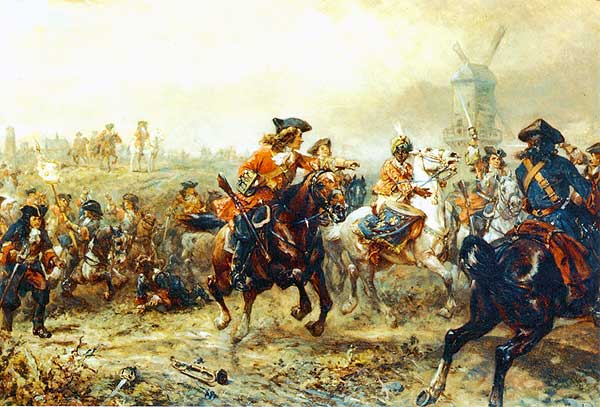The actual war was marked by three decisive battles. Surprisingly for a war of Spanish Succession, none of these battles took place on Spanish soil. The first such decisive engagement took place at Blenheim in 1704. Louis was attempting to seize the Hapsburg capital of Vienna and bring about a quick peace. The Duke of Marlborough marched his British army 250 miles and combined with Prince Eugene’s army to meet the French outside of the small village of Blenheim in August. In a pitched battle, Marlborough displayed a mastery of reserve management, terrain, and the decisive stroke. The French were defeated and Vienna would remain secure for the remainder of the war. The victory shattered the myth of French invincibility and allowed the Allies to complete the capture of Bavaria. For the rest of the war, the French would never again successfully take the offensive.
The second pivotal battle was that of Ramillies in the Spanish Netherlands in 1706.  The French generals had enjoyed some early successes in the year’s campaign season, capturing large chunks territory. Marlborough met a French army outside of the small town of Ramillies on May 23 and thoroughly routed them. Taking advantage of his victory, the allies managed to capture most of the Spanish Netherlands before the end of the campaign season. Coupled with Prince Eugene’s victory at Turin in Northern Italy, 1706 marked the worst year of the war for Louis.
The French generals had enjoyed some early successes in the year’s campaign season, capturing large chunks territory. Marlborough met a French army outside of the small town of Ramillies on May 23 and thoroughly routed them. Taking advantage of his victory, the allies managed to capture most of the Spanish Netherlands before the end of the campaign season. Coupled with Prince Eugene’s victory at Turin in Northern Italy, 1706 marked the worst year of the war for Louis.
 The French generals had enjoyed some early successes in the year’s campaign season, capturing large chunks territory. Marlborough met a French army outside of the small town of Ramillies on May 23 and thoroughly routed them. Taking advantage of his victory, the allies managed to capture most of the Spanish Netherlands before the end of the campaign season. Coupled with Prince Eugene’s victory at Turin in Northern Italy, 1706 marked the worst year of the war for Louis.
The French generals had enjoyed some early successes in the year’s campaign season, capturing large chunks territory. Marlborough met a French army outside of the small town of Ramillies on May 23 and thoroughly routed them. Taking advantage of his victory, the allies managed to capture most of the Spanish Netherlands before the end of the campaign season. Coupled with Prince Eugene’s victory at Turin in Northern Italy, 1706 marked the worst year of the war for Louis.
No comments:
Post a Comment